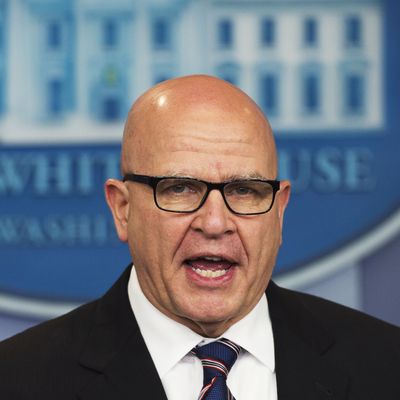
On Monday evening, the Washington Post reported that Donald Trump had disclosed highly classified information about the Islamic State during his Oval Office meeting with Russian foreign minister Sergey Lavrov and ambassador Sergey Kislyak last week.
A little over an hour later, National Security Adviser H.R. McMaster declared this story false — without actually disputing its substance. The basic facts of the Post’s account were as follows:
• Trump surprised White House staff by sharing “highly classified” information with the Russians.
• This information was given to the United States by an ally — and our government did not have permission to share it.
• The intelligence concerned the Islamic State and potential attacks on aviation.
• Trump disclosed the city where this intelligence was gathered — and that detail might allow Russian operatives to deduce the sources and methods that yielded the information.
• Some national security professionals are deeply concerned by Trump’s disclosure.
In his initial statement, McMaster did not directly rebut any of these points. Instead, he emphatically denied that Trump had shared “sources or methods” — a claim the Post never made. Nonetheless, he declared that “the story that came out tonight, as reported, is false.” He also said, “I was in the room. It didn’t happen.”
And then, on Tuesday morning, the president posted a pair of tweets that appeared to confirm key aspects of the Post’s report.
Trump did not explicitly state that he shared classified information with the Russians. But, as mentioned, the Post’s report indicated that the intelligence concerned the Islamic State’s plans for executing attacks on airlines. And the phrase “which I have an absolute right to do” reads as an invocation of the president’s privilege to share classified information.
So, when McMaster returned to the podium late Tuesday morning, he had a lot of explaining to do.
And the upshot of the ensuing remarks was this: McMaster disputed virtually none of the details of the Post’s story, but took issue with its framing.
“The premise of that article is false — that, in any way, the president had a conversation that was inappropriate, or that resulted in any kind of lapse in national security,” McMaster said, before insisting that the real national security threat came from those who leaked the details of Trump’s meeting to the press. (One may read that last bit as a tacit endorsement of the veracity of the Post’s story — were it wholly false, there would be no leakers to hunt down, only fabulists.)
McMaster did not confirm or deny that Trump had shared classified information; or that said information was given to the U.S. by an intelligence partner; or that Trump had disclosed the location where that intelligence was gathered.
Further, the national security adviser did confirm that the decision to disclose this information was the president’s alone: The political neophyte did not request the guidance of anyone in his administration before sharing the intelligence — and decided to make his disclosure in the spur of the moment.
“As you know, it’s wholly appropriate for the president to share whatever information he thinks is necessary to advance the security of the American people,” McMaster said. Asked when Trump had made that decision, the national security adviser replied, “he made that decision in the context of the conversation.
McMaster explains Trump’s decision “in the context of the conversation.”
McMaster went on to say that, “The president wasn’t even aware of where this information came from, he wasn’t briefed on the source or method of the information.”
McMaster did contend that Trump’s disclosure had not jeopardized the cooperation of any U.S. allies — although he would not say whether the United States had permission to share the information that it did.
The heart of McMaster’s argument was that it is both legal and proper for a president to decide to share highly classified information in the context of a private meeting with foreign diplomats. Russia has suffered significant civilian casualties from terrorism in the past. Trump pressed the Russians on many difficult subjects during other parts of the conversation, and when the topic turned to ISIS, the president made the calculation that the benefits of providing greater cooperation on intelligence in that moment outweighed the costs. And that was his call to make.
This argument might sound reasonable to someone who just woke up from a coma, and has not yet realized that the president is that Donald Trump.
Right now, our commander-in-chief is a reality star who betrays a conspicuous ignorance of geopolitics any time he discusses them; openly admits that he thought this job would be easier; and refuses to read briefings that are longer than a single page — a quirk that may explain why he was not aware of the source of the intelligence he disclosed.
To believe that it is “wholly appropriate” for this president to unilaterally decide to disclose highly classified information to an adversary, one must have enormous trust in Trump’s judgment.
Which is to say: Either McMaster doesn’t actually believe what he is saying, or we no longer have reason to trust in his judgment.






























